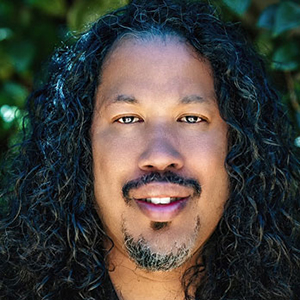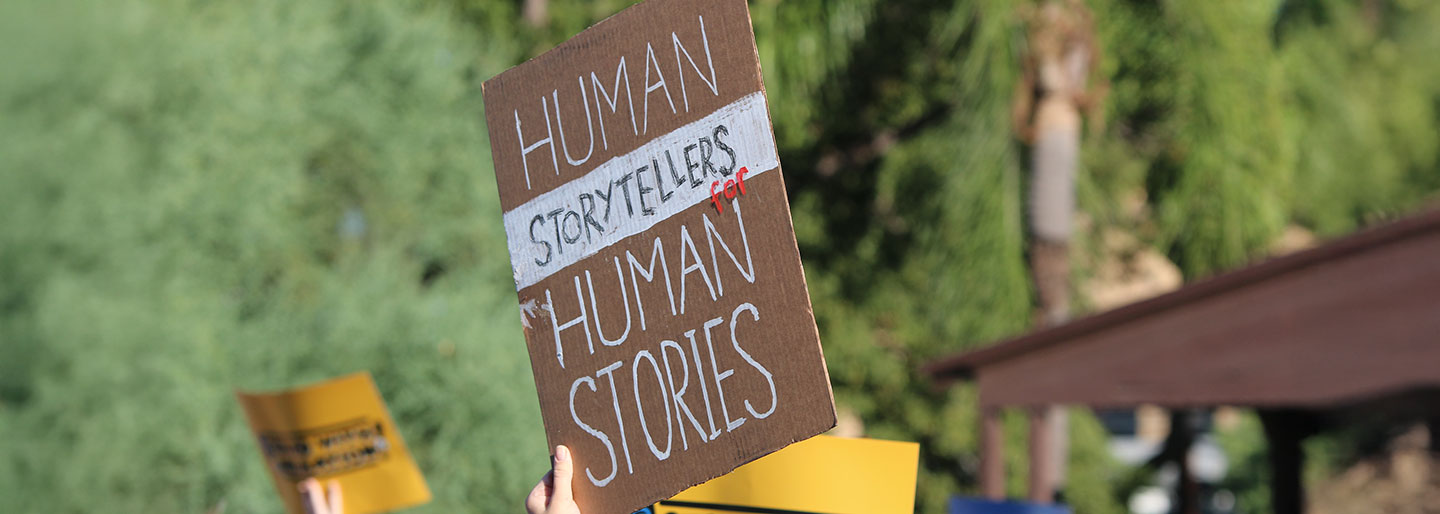The release of ChatGPT to the public in late 2022 was a technological development that the WGA, its members, and workers throughout the industry watched with a sense of grim anticipation. The Guild was set to begin its negotiation for a new MBA, and as studios sought out ways to implement speed-ups, piling more work onto fewer writers, artificial intelligence (AI) loomed as a threat that could affect the industry in significant ways.
Consequently, the fight to mitigate harms to writers posed by AI—which began during those 2023 contract negotiations and was a factor in the 2023 strike—continues.
“This union has spent years fighting to give writers a share in the value of their work,” said John Rogers, co-chair of the WGAW’s AI Advisory Committee. “Our collective bargaining agreement has contained concepts of authorship, credit, and payment for the reuse of writers’ work. We refuse to allow AI to steal our work.”
 WGAW AI Advisory Committee Co-chair John Rogers.
WGAW AI Advisory Committee Co-chair John Rogers.The 2023 MBA guarantees that material generated by AI does not count as assigned material for compensation purposes or source material for determining credits and can’t be used to disqualify a writer for separated rights, meaning writers hired to work on AI-created material can’t be paid a lesser rewrite fee for that work. A writer cannot be forced to use a generative AI program, such as ChatGPT, in their employment. The company must also disclose to the writer if any material given to the writer has been generated by AI or uses AI-generated material.
At the heart of these regulations is the Guild’s position that neither traditional AI (such as that used in CGI and VFX) nor generative AI (meaning AI used to produce written material) is a writer, and so no written material produced by those technologies can be considered literary material. Generative AI models are built on the mass theft of writers’ work and derive all of their value from the training material they have stolen.
As mandated by the 2023 MBA, the Guild has met individually with every major studio about the potential use of AI in their film and television development and production. So far, the Guild has not seen evidence that these studios are using AI to generate written material, or that writers are being assigned to work with AI-generated material. The Guild will continue to closely track the actual or potential use of the technology in our industry.
Since the companies—not writers—own the copyright, post-strike the Guild has also confronted the CEOs of the major studios with their failure to act in the face of this unprecedented theft of their copyrighted material, urging them to “come off the sidelines.”

This union has spent years fighting to give writers a share in the value of their work. Our collective bargaining agreement has contained concepts of authorship, credit, and payment for the reuse of writers’ work. We refuse to allow AI to steal our work.
- John Rogers
The WGAW Board appointed the AI Advisory Committee, co-chaired by Board members Rogers and Deric Hughes, to track on-the-ground writer experiences with AI, and provide the Guild with insight on the implications of AI development for the profession.
The members of this committee, in coordination with staff, keep up with developments in AI and possible writer implications, along with participating in policy discussions on AI and labor such as the “Making Tech Work for Workers” conference hosted by the University of California labor centers and a Workforce Equity Summit held by the UCLA Labor Center and the office of California Senator Smallwood-Cuevas (CA-28).
 WGAW AI Advisory Committee Co-chair Deric Hughes.
WGAW AI Advisory Committee Co-chair Deric Hughes.“The studios who initially refused to even put AI protections on the table during the 2023 bargaining cycle must be held accountable,” said Rogers, who recently participated in an AI discussion at the Workforce Equity Summit. “If we let down our guard even a little bit, these same studios will take every opportunity to underpay us, worsen our employment conditions, and prevent us from sharing in the value of what we create. We will not let that happen.”
“As we continue to hear back from writers about their encounters and dealings with AI, members have been relieved to know that the Guild has been keeping a close eye on what’s happening and that our committee is part of that ongoing effort not only to be on the lookout for how this technology is evolving, but to make certain the MBA protections we all fought so hard, for are being followed,” added Hughes.
Writers should also be vigilant about developing uses of AI, such as transcription on Zoom pitch meetings—which is the equivalent of demanding that a writer leave free written material behind. Writers should refuse consent to AI transcription on Zoom.
The WGAW is also taking on the mass theft of writers’ work through policy advocacy both domestic and international. The WGAW has participated with colleagues in the European Union’s consultation on general-purpose AI models under the EU AI Act and endorsed federal legislation requiring AI developers to disclose all copyrighted works used in building or altering training datasets for AI models.
Any writer who has encountered AI in the course of any WGA-covered employment should contact the WGAW’s Research and Public Policy Department.
“We will closely monitor any technological ‘advancements’ that can affect writers’ work and leverage,” Rogers said.





